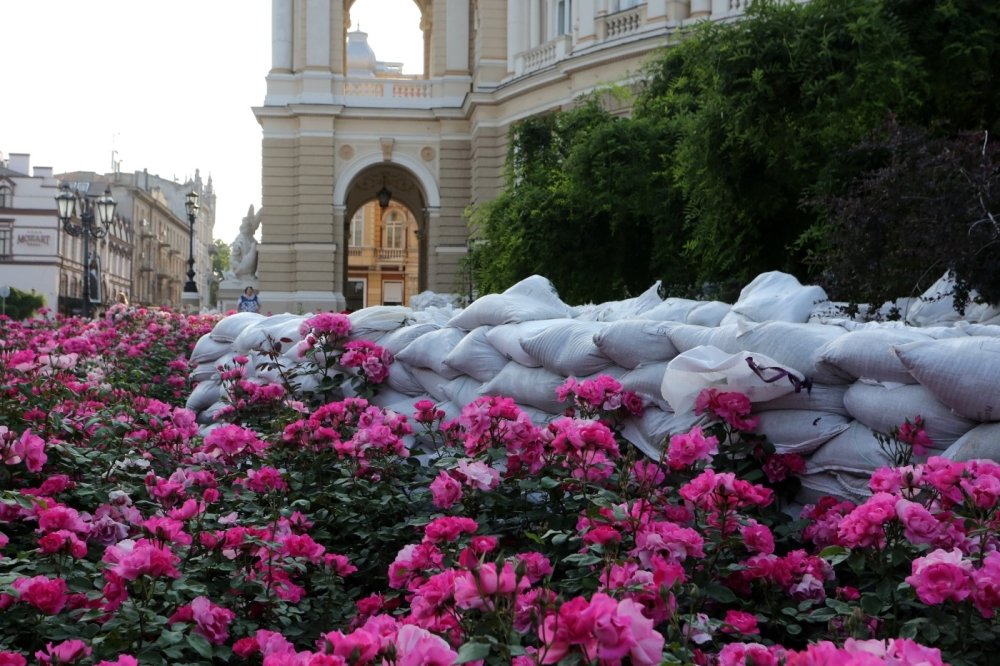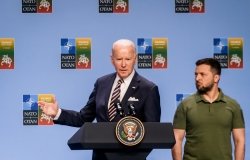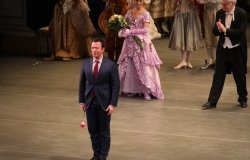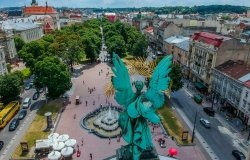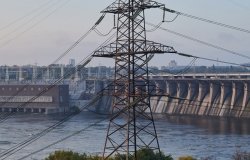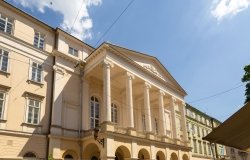
A blog of the Kennan Institute
Two Years of Horror, Hardship, and Hope
Two years into the war, the Odesa Philharmonic Orchestra continues to provide hope and merriment for audiences both within Ukraine and outside it. The group ended 2023 with a whimsical YouTube greeting on an airplane, en route to a 10-day, nine-concert tour in Italy, performing a series of holiday concerts featuring Strauss waltzes and joyous Viennese musical puffery. The ensemble then returned home for its traditional “Old” (Orthodox) New Year’s concert of light music on January 18.
The story of Odesa’s notable symphony orchestra over the past two years is the story of the city, and of Ukraine. Russia’s February 2022 invasion could well have brought the curtain down on this distinguished outfit’s long history. Orchestra musicians and staff immediately scattered at the start of hostilities. Some orchestra members went to the front, others went abroad, and still others stayed at home in a city that found itself on the front lines. By late 2022, they came together to perform in their home concert hall, despite air raid sirens, blackouts, and Russian drone attacks. Remarkably, the group offered a full season of concerts throughout 2023.
Even though each new performance represents a small symbol of hope for what might follow once the war ends, a classical music concert cannot offset the horrors and hardships of war. Odesa has come under Russian air attack since the war’s opening salvos, with tragic consequence. Russian rockets have interrupted rehearsals and even performances. Yet audiences still make their way to the orchestra’s historic concert hall. For an hour or two, each show has offered momentary—and sustaining— delight.
These essays began with an account of the orchestra’s last prewar concert, on the evening of February 12, 2022. Venezuelan American conductor Hobart Earle surprised the audience that night with a stirring encore: the overture to Mykola Lysenko’s opera Taras Bulba. The audience reacted in a patriotic frenzy, with a loud, booming voice caught on the concert’s video shouting “spasibo!” (“thank you” in Russian). This moment captured a deep moment of resistance which would be tested in the days ahead. That video left little doubt that even Russian-speaking Odesans were not going to line the city’s streets waving Russian flags to greet a conquering army. Odesa, like Ukraine in its entirety, was ready to resist.
Even though the orchestra scattered once the war began, its members remained in touch. On September 6, 2022, the ensemble gathered for a triumphant concert at the prestigious Berliner Musikfest. The Berlin performance captured the attention of the classical music world, with rave reviews in Europe, an article in the New York Times, and coverage by the BBC.
Maestro Earle also lectured in Berlin about Ukrainian classical music, at the invitation of Daniel Barenboim. He subsequently repeated his video-infused readings around Europe and across North America, spreading the word that Ukraine had its own, distinctive classical catalog.
Regular concerts restarted in Odesa, following strict civil defense protocols. On January 13, 2023, Earle led the full orchestra for that year’s “Old” New Year’s concert in front of 1,000 listeners in a sold-out Philharmonic Hall. Regular concerts have continued since.
Two years ago, many commentators predicted an easy Russian victory. Few believed that Ukraine could hold out, let alone regain much of the territory the Russians gained initially. Their forecasts made sense based on traditional indices of military preparedness. But those who watched the video of the philharmonic’s performance of Lysenko’s overture had a momentary glimpse at a factor which has proven to outweigh such calculations: the will to resist.
For two years, these essays have chronicled the war through the lens offered by the performing and visual arts. They have revealed a powerful defiance among Ukrainians that has carried them well past predictions of their inability to withstand the Russian assault. If, as far too many in the West now suggest, it is time to cave to Putin’s brutal military campaign, the arts indicate that the Ukrainians have not read the same memo.
Many among the hundreds attending the 2024 New Year’s concert have suffered horrific personal losses as the war has ground on. Those who have remained in Odesa have done so despite untold hardship. They come to listen to—and to play—music in hope. Given the orchestra’s achievements since Odesa became a frontline city, such hope is warranted.
The opinions expressed in this article are those solely of the author and do not reflect the views of the Kennan Institute
See our newest content first.
Subscribe to receive the latest analysis from Focus Ukraine
About the Author

Blair A. Ruble
Former Wilson Center Vice President for Programs (2014-2017); Director of the Comparative Urban Studies Program/Urban Sustainability Laboratory (1992-2017); Director of the Kennan Institute for Advanced Russian Studies (1989-2012) and Director of the Program on Global Sustainability and Resilience (2012-2014)

Kennan Institute
The Kennan Institute is the premier US center for advanced research on Russia and Eurasia and the oldest and largest regional program at the Woodrow Wilson International Center for Scholars. The Kennan Institute is committed to improving American understanding of Russia, Ukraine, Central Asia, the Caucasus, and the surrounding region though research and exchange. Read more
